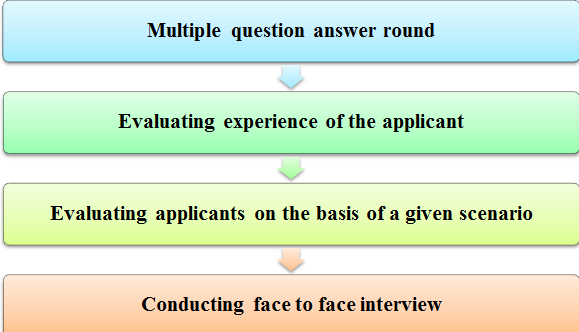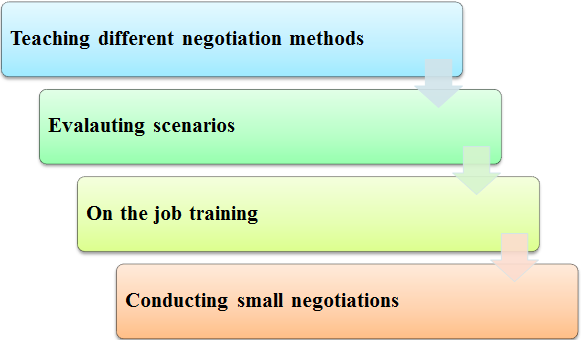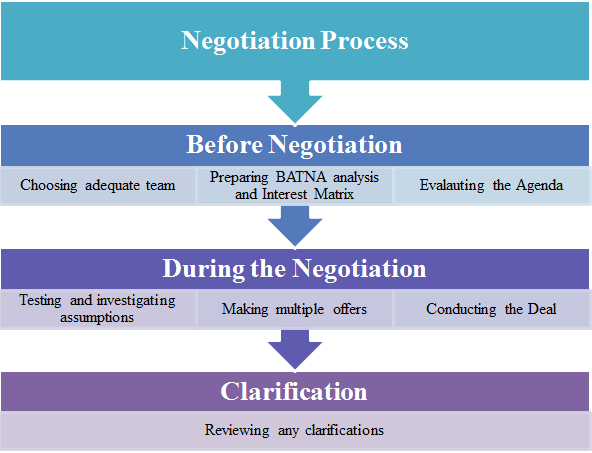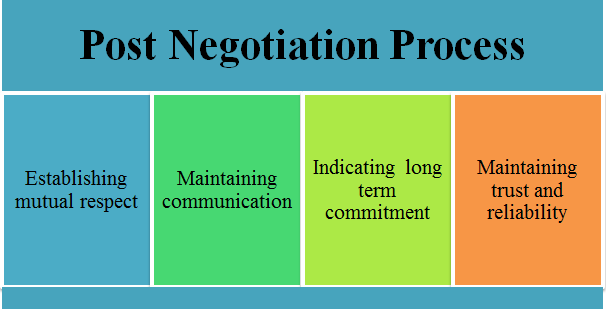Bonanza Offer FLAT 20% off & $20 sign up bonus Order Now
The overall study mainly helps in evaluating the significance of negotiation skills needed by business to increase successful transactions. Furthermore, the study also helps in evaluating the current negotiation process used by companies to make adequate decisions. In addition, the novice effectively recommends different types of negotiation process, which could be used by companies to strengthen their cause. The study also helps in evaluating post negotiation process, which must be followed by companies to ensure their resolve. With the help of BATNA analysis and Interest Matrix, companies are able to strengthen their negotiation skills.
With the help of adequate selection and training process, companies are able to deploy effective negotiators during the negotiation process. In addition, the deployment of effective negotiators mainly ensures that the company gets a viable and profitable deal from the transaction. However, choosing the best negotiators is the main problem, which many company faces. On the other hand, Kim (2013) criticises that some companies are not able to segregate between negotiators and sales representative, which in turn affects their ability to conduct effective transactions. Take Royal Dutch Shell plc as an example the company mainly deals with oil and gas products. In addition, seeing the current decline in oil prices Shell plc might need effective negotiators to sell their products on competitive prices and make profits. In this context, Malhotra and Bazerman (2008) stated that negotiators conduct an in-depth research to evaluate the financial capacity of the second party.

Figure 1: Showing the selection process of negotiators
(Source: Kim 2013)
Moreover, the company to increase their bargaining power could use the selection process described in figure 1. On the other hand, Cullen et al. (2013) criticises that negotiators with relative experience are not able to increase bargaining power of its company, which in turn might negatively affect its revenue generation capacity. Furthermore, the selection process evaluates the candidates based on experience and ability to act on a given scenario, which might help in evaluating capability of the candidate on certain circumstances. White et al. (1984) mentioned that effective negotiation skills in marketing executives help in generating higher sales and profitability for the company. With the help of the above-mentioned selection process, the company might effectively use efficient negotiators, which could help in increasing its revenue generation capacity.

Figure 2: Showing the training process of negotiators
(Source: Ahammad et al. 2016)
Figure 2 mainly helps in evaluating the training process that could be used by the company to increase efficiency of its negotiators. Moreover, this training process could help in initiating and evolving negotiation skills of the current employees. Furthermore, the different methods of negotiations like Best Alternative Toa Negotiated Agreement (BATNA) and Zone of Possible Agreement (ZOPA) could be effectively taught to the negotiators, which might help increase their bargaining power. Zastrow (2014) cited that with the help of training process companies are able to develop the required skills in their negotiators, which might help in conducting effective transactions. However, Ahammad et al. (2016) argued that increased training process could reduce cash availability of the company and in turn might affect its working capital. Furthermore, Tourism companies, while selling holiday packages mainly use ZOPA negotiation method to evaluate the financial capability of its customers. This negotiation method mainly helps in companies to customise and provide relevant services according to financial capability of its customers.
With the help of effective selection and training process, negotiators of the company could effectively increase its bargaining power among potential customers. Furthermore, this process could not only help the company increase trust among customers but also among its sellers. Moreover, the company might mainly compromise its capital to initiate the training and selection process, which might be helpful in upgrading its negotiators. On the other hand, Wilson and Thompson (2014) criticises that increased investments in training process could reduce liquidity of the organisation. However, Shyur sand Shih (2015) stated that training process mainly helps in improving quality and productivity of the workforce used by the company.
The overall negotiation process mainly helps the company to make adequate decisions regarding viability of the transaction. Moreover, the negotiation process also helps the negotiators to evaluate the financial capability of the other party. Furthermore, the overall negotiation process is as follows.
Before Negotiation:
Before starting the negotiations, the company could effectively select appropriate team, which could deliver the required output from the meeting. Furthermore, the crew selection is most important, as it helps in strengthening the negotiators resolve. Furthermore, the use of BATNA analysis, Interest Matrix and ZOPA could effectively help the negotiators to understand and evaluate the second party. Insurance companies like Prudential plc mainly use BATNA analysis to provide relevant offers to its customer, which in turn helps in increasing its sales. Furthermore, Prudential plc uses ZOPA evaluate the financial capability of the customer and pitch adequate insurance product (Prudential.com.sg 2016).
During Negotiation:
During negotiation, the negotiator could effectively analyse and deliver offers to the other party after conducting effective research. Furthermore, with the help of effective testing and investigating the company’s negotiators could effectively evaluate the financial position of the other party. Thus, it could help the negotiators to quote an effective price, which is both viable and attractive to the other party. Furthermore, after all the conclusive arguments and offering the negotiators could effectively make the deal, which is profitability for the company. Insurance sectors companies mainly use negotiators to initiate and customise plans to suit the needs of defence customers (Prudential.com.sg 2016).
Clarification:
After the completion of the deal the negotiators effectively clarifies any kind of queries or problems, which might be faced by the other party. This process mainly decreases complaints and increase loyalty of customers for the company. In this context, Sakakibara and Kimura (2013) mentioned that adequate after sales services mainly help companies to increase word of mouth advertisements.

Figure 3: Showing the effective Negotiation process
(Source: Sakakibara and Kimura 2013)
Post Negotiation process is as significant as the negotiation process and helps in strengthening bond between the two parties. Furthermore, with the help of effective post negotiation process the company could maintain a healthy relationship with its clients. In this context, Yiu and Saner (2014) stated that post negotiation process enables the company to make future transactions with the same customer, which mainly helps in creating a strong customer base. Companies like Huttons Asia Pte Ltd, which deals in real estate industry uses post negotiation process to maintain good relationship with its customers. This process mainly helps the company to increase word of mouth advertisements, which in turn helps in raising its customer base. The post negotiation process that could be followed by the company is as follows.
Establishing mutual respect:
The negotiators during the negations process mainly establishes a mutual understanding, which mainly develops to respect after the process. This mutual respect for each other mainly helps the company to maintain good relations with the other party. Thus, establishing a long lasting relationship could be beneficial for both the parties (Kim 2013).
Maintaining communication:
After the negotiation process, the negotiators of the company mainly maintain communication with the other party, which in turn helps them to bond. This continued communication mainly reduces any kind of complaints that might arise after commencement of the deal. Retail companies like BreadTalk ltd mainly uses SMS to maintain communication with its customers and deliver messages containing attractive offers (Breadtalk.com 2016).
Indicating long-term commitment:
The main motive of the negotiators is to establish a long-term commitment with the other party, which could only be maintained with the help of effective communication. Moreover, this indication of long-term commitment could only be delivered after completion of the deal. In this context, Cullen et al. (2013) mentioned that negotiators secondary motive is to establish long-term relation with its customers, which in turn might boost customer base of the company.
Maintaining trust and reliability:
Furthermore, the negotiators maintain a proactive approach to reduce any kind of challenging behaviour, which might affect in building trust and reliability with the other party. Moreover, accuracy in depicting the product to the other party also helps in building trust of customers. In addition, the negotiators of Prudential plc provide relevant insurance product, which might provide the same depicted results to its consumers.

Figure 4: Showing the effective Post Negotiation process
(Source: Cullen et al. 2013)
Due to the lack of personal experience, an interview with the marketing executive of Savills Singapore a real estate company could help in evaluating its negotiation process. Furthermore, the marketing executive mainly tried to sell one of the properties, which is being developed by the Savills Singapore. Moreover, the marketing executive effectively researched all about its client before going to the meeting. This mainly enabled the executive to establish a relevant financial background and capability of the buyer. As the development of the property will be being going on for more than 3 years the initial investors will be provided with attractive investment opportunity. Moreover, the marketing executive in the meeting mainly established the benefits that could be provided from the investment (Ahammad et al. 2016). In addition, the prices quoted by the customer mainly depicted a negotiation anchor, which might sink the whole deal. However, the experience of the executive mainly helped in renegotiating the overall prices and ended the meeting on sale.
In addition, the experience and convincing skills mainly helped the marketing executive of Savills Singapore to conduct relevant sales. Wilson and Thompson (2014) stated that with relevant experience employees could effectively use techniques such as motivation and manipulation in the negotiation process. Yiu and Saner (2014) further stated that in the current market scenario negotiators mainly comprises of marketing executive that help companies to capture relevant market share in the industry.
The main problems that could be identified from the negotiation process conducted by the marketing executive of Savills Singapore are as follows.
After effective evaluation of the negotiations proceeds used by the marketing executive of Savills Singapore, certain limitation could be identified. In addition, the executive could have effectively used method like ZOPA and Interest Matrix to evaluate the financial position of the client. This could mainly help in pitching an effective price, which might be more agreeable, which might conduct the transaction more smoothly and quickly. Furthermore, the executive could have used more team members to strengthen their cause, which in turn might have helped in evaluating the position of the client. Furthermore, the executive could have prepared relative answers, which could have been raised in the meeting. This preparation could mainly help the executive to make quick responses to client’s questions and portray their confidence level. In this context, Sakakibara and Kimura (2013) mentioned that inclusion of relevant theories and methods mainly help employee to make adequate sales. On the other hand, Shyur and Shih (2015) criticises that without relevant experience, models and theories could not help the employees to generate the required sales for the company.
The study mainly depicts the significance of negotiation skills, which could be used by companies to increase their revenue generation capacity. Furthermore, the study effectively evaluates the selection proves that could be used by companies to employee and train effective negotiators. Furthermore, the novice effectively depicts the negotiation process, which could be used by different companies to increase their sales. In addition, the study also helps in evaluating post negotiation process, which could be used by the company to increase trust and reliability among its customers. Finally, an effective analysis and suggestion on the negation deal conducted by executive of Savills Singapore is described in the study.
Ahammad, M.F., Tarba, S.Y., Liu, Y., Glaister, K.W. and Cooper, C.L., 2016. Exploring the factors influencing the negotiation process in cross-border M&A. International Business Review, 25(2), pp.445-457.
Breadtalk.com. (2016). BreadTalk Group - Home. Available from: http://www.breadtalk.com/ [Accessed on 1 Aug. 2016].
Cullen, M.J., Muros, J.P., Rasch, R. and Sackett, P.R., 2013. Individual differences in the effectiveness of error management training for developing negotiation skills. International Journal of Selection and Assessment, 21(1), pp.1-21.
Kim, Y.M., 2013. Do You Want an Efficient Negotiator or an Ethical One: Goal of the Negotiation Teaching in Law School. The Asian Business Lawyer, 11(???), pp.125-142.
Malhotra, D. and Bazerman, M.H., 2008. Negotiation genius: How to overcome obstacles and achieve brilliant results at the bargaining table and beyond. Bantam.
Prudential.com.sg. (2016). Prudential Insurance Singapore | Premier Insurance & Investment Plans Provider. Available from: https://www.prudential.com.sg/corp/prudential_en_sg/ [Accessed on 1 Aug. 2016].
Sakakibara, H. and Kimura, K., 2013. Experimental study on negotiation process in participatory decision making process in a community. Group Decision and Negotiation, 22(1), pp.71-84.
Shyur, H.J. and Shih, H.S., 2015. Designing a multi-issues negotiation support system based on prospect theory. Information Sciences, 322, pp.161-173.
White, J.J., Fisher, R., Fisher, R. and Ury, W., 1984. The Pros and Cons of" Getting to Yes".
Wilson, E.R. and Thompson, L., 2014, January. The Influence of Asymmetric Creative Thinking on the Negotiation Process and Outcomes. In Academy of Management Proceedings (Vol. 2014, No. 1, p. 13212). Academy of Management.
Yiu, L.S. and Saner, R., 2014. Sustainable Development Goals and Millennium Development Goals: an analysis of the shaping and negotiation process. Asia Pacific Journal of Public Administration, 36(2), pp.89-107.
Zastrow C., ‘Social workers and sales workers: Simulation and difference.’ Journals of Independent Social Work. 4(3) p.7-16
MyAssignmenthelp.co.uk is a name in assignment writing services that students trust. We offer our assignment writing services for a wide variety of assignment including essays, dissertations, case studies and more. Students can place their order with us anytime as we function 24x7, and get their copies at unbeatable prices. We guarantee that all of our solutions are plagiarism-free.
Upload your Assignment and improve Your Grade
Boost Grades